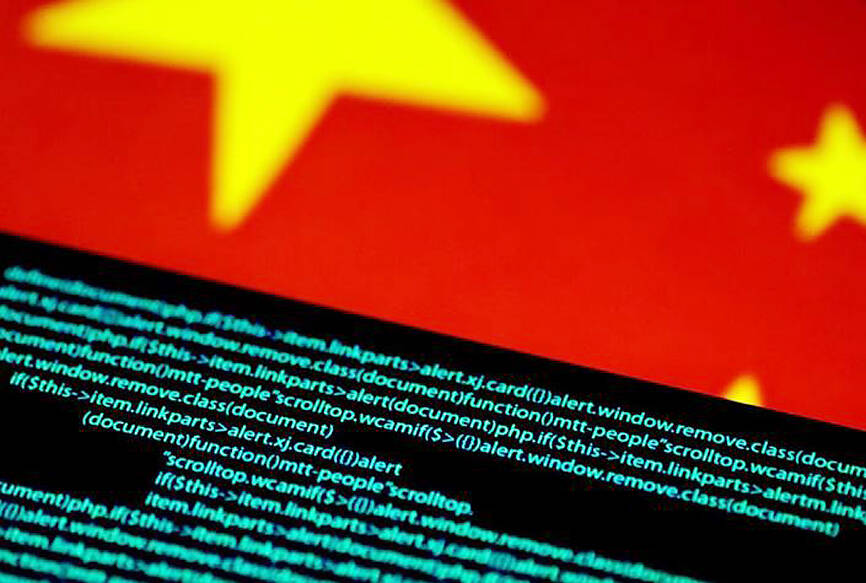An amendment requiring government permission for people working with state-funded core technologies to travel to or transit in China took effect yesterday after the Executive Yuan announced the changes a day earlier.
Lawmakers passed the amendments to articles 9 and 91 of the Act Governing Relations Between the People of the Taiwan Area and the Mainland Area (臺灣地區與大陸地區人民關係條例) in May last year.
The changes revolve around the creation of a regulatory mechanism to control China-bound travel or transit of people who work with core technologies, and safeguards to prevent Beijing-affiliated entities from conducting illicit investments or business operations in Taiwan.

Photo: Reuters
The rules about entities affiliated with Beijing took effect in November last year.
The regulations governing personnel working with core technologies require people, legal persons, institutions and other entities that receive more than a specified level of state funding to obtain permission to travel to China.
The restrictions apply to people, groups and other entities three years after they retire, are discharged from duty or otherwise released from their contractual obligations.
Those who contravene the law face a fine of NT$2 million to NT$10 million (US$65,062 to US$325,309).
The definition of “core technology personnel” and standards for authorizing their China-bound transit or travel were specified by the Executive Yuan.
The National Science and Technology Council is to establish a national core technology evaluation committee to set the definition for “core technology” and make determinations about authorizing transit and travel.
Additionally, entities involved in core technologies that receive more than 50 percent of their funding from the government must submit to the National Immigration Agency and the National Science and Technology Council a list of the people who have access to sensitive technologies.

Alain Robert, known as the "French Spider-Man," praised Alex Honnold as exceptionally well-prepared after the US climber completed a free solo ascent of Taipei 101 yesterday. Robert said Honnold's ascent of the 508m-tall skyscraper in just more than one-and-a-half hours without using safety ropes or equipment was a remarkable achievement. "This is my life," he said in an interview conducted in French, adding that he liked the feeling of being "on the edge of danger." The 63-year-old Frenchman climbed Taipei 101 using ropes in December 2004, taking about four hours to reach the top. On a one-to-10 scale of difficulty, Robert said Taipei 101

Nipah virus infection is to be officially listed as a category 5 notifiable infectious disease in Taiwan in March, while clinical treatment guidelines are being formulated, the Centers for Disease Control (CDC) said yesterday. With Nipah infections being reported in other countries and considering its relatively high fatality rate, the centers on Jan. 16 announced that it would be listed as a notifiable infectious disease to bolster the nation’s systematic early warning system and increase public awareness, the CDC said. Bangladesh reported four fatal cases last year in separate districts, with three linked to raw date palm sap consumption, CDC Epidemic Intelligence

Two Taiwanese prosecutors were questioned by Chinese security personnel at their hotel during a trip to China’s Henan Province this month, the Mainland Affairs Council (MAC) said yesterday. The officers had personal information on the prosecutors, including “when they were assigned to their posts, their work locations and job titles,” MAC Deputy Minister and spokesman Liang Wen-chieh (梁文傑) said. On top of asking about their agencies and positions, the officers also questioned the prosecutors about the Cross-Strait Joint Crime-Fighting and Judicial Mutual Assistance Agreement, a pact that serves as the framework for Taiwan-China cooperation on combating crime and providing judicial assistance, Liang

US climber Alex Honnold left Taiwan this morning a day after completing a free-solo ascent of Taipei 101, a feat that drew cheers from onlookers and gained widespread international attention. Honnold yesterday scaled the 101-story skyscraper without a rope or safety harness. The climb — the highest urban free-solo ascent ever attempted — took just more than 90 minutes and was streamed live on Netflix. It was covered by major international news outlets including CNN, the New York Times, the Guardian and the Wall Street Journal. As Honnold prepared to leave Taiwan today, he attracted a crowd when he and his wife, Sanni,